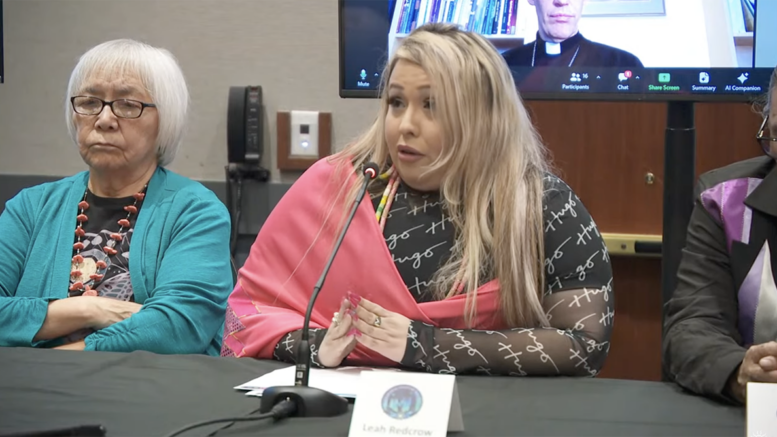By Jeremy Appel, Local Journalism Initiative Reporter
(ANNews) – A year after announcing the discovery of undocumented mass graves at the former Blue Quills Residential School, the head of the Acimowin Opaspiw Society (AOS) says the RCMP and Alberta chief medical examiner are refusing to assist in their investigation.
The AOS is a non-profit based out of Saddle Lake Cree Nation, where Blue Quills operated from 1898 to 1932 before the forced assimilation institution was moved to St. Paul County, where it remained until its closure in 1970.
At a Jan. 24 press conference on Enoch Cree Nation, AOS executive director Leah Redcrow said this lack of cooperation from authorities is the product of “continued negligence and institutional racism against our people.”
The first of the communal graves was discovered by “accidental excavation” in 2004 around 200 metres north of the school’s grounds. There the excavator found “numerous child-sized skeletal remains contained in communal pits,” said Redcrow.
“The remains were not protected in caskets, and instead were wrapped in white shrouds,” she added.
Jason Whiskeyjack, the accidental excavator, said “we didn’t think anything of it, because it wasn’t brought to our attention that the residential school was there at the time.”
The site was inspected by AOS via ground-penetrating radar (GPR) in 2022 and by looking through historical records in 2022 to determine who is buried there and how they died.
“We understood that at some point it would require excavation followed by recovery of the bodies inside. We’re unable to determine specific numbers or causes of death until the excavation and recovery concludes,” Redcrow explained.
AOS is aware of 15 children reported as missing from Blue Quills, which was also known as Sacred Heart, owing to the name of the nearby Catholic cemetery.
Another communal grave site was later discovered by a family on their property near the school’s foundations, Redcrow said.
“To be clear, communal burials or mass graves violate international humanitarian law, as they deny the victims individuation and death,” she noted.
Because of the RCMP medical examiner’s unwillingness to participate, in October the AOS approached the Netherlands-based International Commission on Missing Persons (ICMP), which specializes in mass burial forensics investigations, for their expert analysis on photos of the skeletal remains they uncovered.
ICMP forensic analyst Soren Blau, who also spoke at the news conference, said she “was able to confirm they were human cranial, postcranial and dental remains.”
“The skeletal elements and dental remains appeared dry weathered, many had evidence of post mortem damage,” Blau added.
Based on the size of the bones and development phase of the teeth, she determined the remains were from a child, or children, under the age of five, but the remains appear to belong to an individual child.
The society is planning on conducting a “humanitarian forensic recovery effort” in the summer, Redcrow said.
“Collectively, we as an organization and all Canadians have an international legal obligation to ensure communal burials or mass graves, as they’re also known, are investigated, and that the victims remains are identified with DNA and returned to living descendants where possible,” she said.
A challenge in excavating the graves is that they’re located near the Sacred Heart cemetery, explained Lakehead University archeologist Scott Hamilton, who spoke at Wednesday’s news conference.
“This raises a complex problem of trying to figure out how to explore the open ground in order to identify where unmarked graves might be without intersecting and interfering with the known graves,” he explained.
In a statement to APTN News, Alberta RCMP spokesperson Kesley Davidge said the national police force has no objection to conducting an excavation, blaming the AOS for not following the “process that has been established by various federal agencies and departments.”
“It is not solely the decision of the Alberta RCMP to proceed with further study of the grounds – many governmental, academic, First Nations, and cultural groups need to be consulted before exhumations occur,” she said.



Be the first to comment on "Acimowin Opaspiw Society says police refusing to investigate Saddle Lake mass graves"